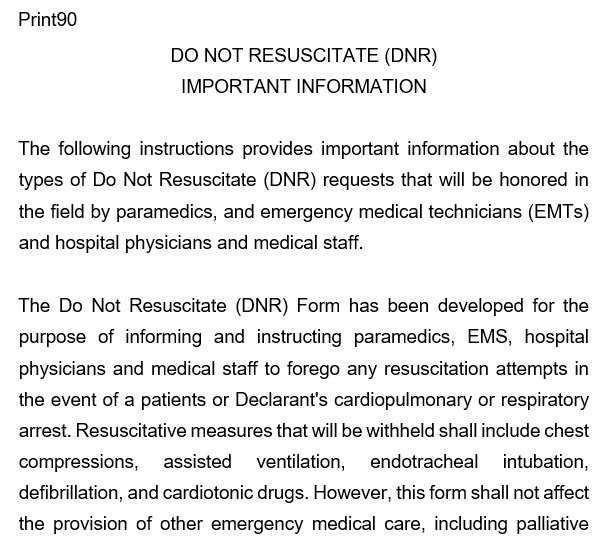Last wills and testaments (otherwise called a will) empower an individual to concede property to their beneficiaries or recipients in the afterlife. The individual who composes the last will and confirmation is known as the testator. The testament accommodates the demeanour of a singular’s bequest as per their desires in case of death. To be substantial in Ohio, the will should be recorded as a hard copy, marked, and dated.
The conventional term for making an arrangement ahead of time to direct the way that your resources are to be disseminated upon death is estate planning. Last will and testament forms are a significant piece of domain arranging in Ohio since they permit you to leave the resources you need to your friends and family while staying away from the expenses and legitimate problems of probate, which depends on intestacy laws. These regulations may not line up with your desires regarding the dispersion of property, and thusly composing a last will and testament is encouraged.
To be substantial in Ohio, the will should be in written form, endorsed by the departed benefactor, dated, and endorsed by two observers present during the signing process. You might decide to compose your own will or have one drafted by a lawyer. This article gives essential data about the last wills that you can use in Ohio. It likewise details how to make one, who can make one, and the significance of having a will.
For what reason Do You Require a Last Will and Testament in Ohio
The territory of Ohio doesn’t command its occupants to triumph when it’s all said and done a last will and testament. Notwithstanding, having one has various advantages. A last will and testament in Ohio enjoy many benefits, including giving solace and a feeling of safety. At the point when you make a will, you realize that your desires will be done and your property will be conveyed as you wish. You may likewise need to name a watchman for your kids and your bequest if you have minor youngsters.
Assuming no gatekeeper is delegated, the courts conclude who will be the watchmen of the kids. You can likewise name a supervisor to care for your estate for the kids’ sake before they arrive at the time of the greater part. In Ohio, the last will and testament likewise permit you to name associations and people other than family as recipients. A last will and testament can likewise be utilized to lay out pet trusts to focus on any pets you abandon. At long last, through the last will and testament, Ohio inhabitants can select an agent to regulate and do the will’s mandates in the afterlife. This guarantees that your desires as a departed benefactor are done regardless of whether you are as of now not alive.
On the off chance that you die without a last will, the courts will pursue all choices regarding your home in light of intestate regulations, which may not be to your greatest advantage. Without a trace of a will, you can not direct your inheritance or plan for what’s to come. Your friends and family and beneficiaries might need to go through court procedures to decide how your resources will be disseminated. Preferably, intestate regulations focus on your life partner and relatives as recipients of the home.
Assuming there is no enduring life partner or youngster, they are trailed by your folks or grandkids. The rundown then, at that point, goes to the closest relative, like kin, aunties, uncles, and so forth, until all close family members are depleted. This interaction can be tedious, unpleasant, and costly assuming that lawful portrayal is required. If the court decides you have no enduring family members, the state turns into the authorized beneficiary.
The most effective method to Make a Will in Ohio
You can draft your own last will and testament in Ohio, utilize a layout, or hold the administration of a certified lawyer. No matter what methodology has been taken, the accompanying advances can be utilized to set up the record:
Stage 1: Take a look at the qualifications and prerequisites
The qualification of the testator is the principal part of a legitimate last will that should be thought of. The prerequisites of a qualified testator can be found in Ohio Rev. Code § 2107.02. The necessities are that nobody younger than 18 can make a substantial last will. The testator should likewise have the intellectual ability to legitimately sign records. This implies you ought to have the option to grasp the conditions of the record, the nature, and degree of the property being conveyed, and pursue objective choices on delicate issues like delegating a watchman for minors. You should not have been decided uncouth by any court, nor would it be a good idea for you to be under the guardianship of some other individual.
Stage 2: Talk with state regulations
The testator should likewise be aware of the laws of the territory of Ohio while making a last will and testament. Appropriate state regulations are given under Ohio Amended Code Title XXI Probate — Adolescent Section 2107 Wills. The last will should likewise fulfil the definition given under ORC 2107.01. This resolution pronounces that the meaning of a will is comprehensive, everything being equal, to a will utilized for lost, obliterated, or ruined wills. Furthermore, any composed instruments are likewise substantial under division (A)(1) of segment 5817.10 of the Revised Code. The expression “will” doesn’t, in any case, incorporate entomb vivos trusts or different instruments that poor person confessed to probate.
Stage 3: Pick your will agent
It is basic to choose an agent to supervise the appropriation of your estate after your demise. It is suggested that you designate your most believed individual as the agent of your will, who is something like 18 years of age and of sound mentality. This is a result of the responsiveness of their capabilities, which incorporate paying obligations, documenting charges, and guaranteeing every recipient accepts their legitimate piece of the home. Because of the intricacy of the regulations administering non-occupant agents, it is prompted that you select an Ohio inhabitant as your agent.
Stage 4: Execute your will
Then, execute your will in the province of Ohio by embracing the accompanying:
- By marking and dating every single page that is seen by two witnesses, the two players being lawful grown-ups (no less than 18 years of age) as per ORC 2107.03. The observers ought to have the option to learn that the testator, started the will readily and not under pressure, intimidation, ill-advised influence, or restriction.
- Guarantee your will is recorded as a written copy and distinguishes the testator’s name, address, district, and state and be endorsed with their name as well as those of the two witnesses. This infers that the will should be on paper. Digital wills are not legitimately enforceable in Ohio. In any case, nuncupative or oral wills are acknowledged in Ohio under unambiguous conditions, like the last minutes before kicking the bucket, where creating a composed last will and testament would be unthinkable.
- Observers of the last will in Ohio ought not to be beneficiaries of the will. Provided that this is true, they ought to give up their “benefits” under the last will.
- Testators can likewise self-demonstrate last will and testament forms in Ohio. By utilizing a self-demonstrating sworn statement, you can make your will a legitimate last will in Ohio. Try to incorporate the region’s seal or stamp.
The most effective method to Revoke or Change a Will in Ohio
Disavowal of last wills is permitted in Ohio. Nonetheless, it should be done lawfully for the ongoing last will and testament to keep on being in force. A will might be denied in Ohio in one of two ways: by making another will that explicitly disavows the particulars of the former one, or by truly obliterating the former one by consuming, tearing, dropping, or eradicating it. You can do so yourself or request an outsider to do it in your presence.
In Ohio, you can likewise change arrangements in your last will by either embedding a supplement or correction or repudiating the will completely. Note that adjustments to your conjugal status can influence arrangements in your last will. Upon separation or marriage refutation, Ohio state regulations consequently disavow any will arrangements that name your mate as a recipient or as an agent. The main exemption is assuming the last will expresses that adjustments of the conjugal agreement don’t influence arrangements of the will under Ohio Fire up. Code § 3107.33.
Ohio’s Laws of Intestacy and Probate
Assuming there is no will indicating how your home ought to be partitioned after your passing, intestacy regulations produce results. The Ohio Reconsidered Code gives explicit rules for the conveyance of property in situations where there are no wills. It gives that the domain ought to be disseminated in the accompanying request:
- If the testator is hitched without any kids, the companion acquires the whole domain.
- If the testator is hitched with kids imparted to a similar life partner (naturally or embraced), then, at that point, the companion acquires the domain.
- Assuming that the testator is hitched and has youngsters outside that marriage, the companion gets 33% of the domain, and the relatives get the leftover part.
- If the testator is unmarried and has children, the children acquire the whole domain.
- Assuming that the testator has no companion or youngsters, the bequest is acquired by their folks, trailed by kin and afterwards the resulting direct relations. Assuming there is no enduring family member, the province of Ohio acquires the domain.
In Ohio, all homes should go through probate court before they get appropriated among the recipients. All home dispersion should be fair and open, and that is the obligation of the probate court. This cycle starts after the passing of the testator. In Ohio, the agent or a relative should record the last will and testament when you kick the bucket. In Ohio, there is no state-commanded cutoff time for recording the will; in any case, there are punishments for neglecting to do as such.
The probate court then, at that point, approves the will and chooses an agent (on the off chance that one has not as of now been designated) to disperse resources as per the desires communicated in the last will and confirmation or intestate regulations, as material. The agent is responsible for social occasion your resources, esteeming them, and advising banks and different specialists. As per the law, the agent goes about as a specialist of the court and is likely to its locale. In the wake of dispersing all resources as per the will, the agent tells recipients of the domain’s end to guarantee everybody accepts their due.
A testator can name anybody as a recipient. Beneficiaries might incorporate not just mates, kids, kin, guardians, grandparents, cousins, uncles, aunties, nieces, and nephews, yet additionally associations like causes.
free Ohio last will and testament form
Ohio last will and testament template
Conclusion
A last will and testament frame what to do on account of somebody’s passing. The last will and testament are alluded to as such because it overwrites any will recently composed. At the point when somebody dies, the latest will they composed is taken to be their last will. Triumphing ultimately a last will and testament is significant. Individuals who have a lot of resources realize that a last will and testament should be composed. Regardless of whether you have a lot of property or riches, you want to triumph ultimately a last will for one extremely basic explanation – it will bring about a lot more straightforward time for your friends and family.
This is because it is exceptionally simple to question the legacy if there is certainly not a legitimate will at present. Triumphing ultimately a last will and testament is critical to guarantee your friends and family won’t need to confront legitimate issues while they are adapting to losing a friend or family member. It is critical to compose a last will and testament that is lawfully void and material. With regards to authoritative reports, it is constantly prescribed to either utilize an expert or follow a layout appropriately. Our last will and testament templates have been expertly composed to guarantee that they are lawfully enforceable.
FAQS (Frequently Asked Questions)
No, you don’t have to notarize your will. It is smart, nonetheless, to guarantee that your marks, as well as those of your observers, are ensured by no less than one of Ohio’s public legal officials.
Holographic wills are legitimate in Ohio if they are transcribed and endorsed by you and two observers. They should likewise follow every one of the legitimate necessities of a valid will in Ohio.
No, Ohio doesn’t gather estate tax or legacy charges. Be that as it may, testators from different states should look at their state regulations in such a manner, as these charges might be material.
You don’t have to enlist a legal counsellor, yet it is suggested that you have one. In any case, making your own last will and testament is not difficult to work, and you can do it without anyone else’s help. On the off chance that you like to draft a last will and testament without help from anyone else, read Ohio’s regulations cautiously and track every one of your resources, as well as their worth, before settling on any dissemination choice.
Assuming you believe somebody should deal with your last will and testament, naming an executor is shrewd. Ensure the individual is reliable and fit. Assuming that you can’t disseminate resources similarly among your main beneficiaries, the executor can split the bequest between them.
In Ohio, you can’t make a computerized will. This is because it is a lawful prerequisite that all substantial last wills and testaments in Ohio be marked and recognized in the “cognizant presence.” The state characterizes “conscious presence” as being close enough to any of the five detects, except for sound and sight created by electronic specialized gadgets.















